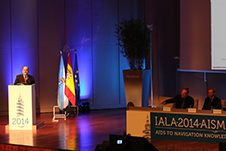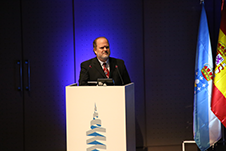
As part of the ‘Global Navigation’ technical sessions at the conference, Schuett’s paper, titled ‘Reducing Operator Workload and Stress Through Cooperative Human-Machine Systems’, covered findings from the EU Artemis Joint Undertaking-funded research project, ‘Designing Dynamic Distributed Cooperative Human-Machine Systems’ (D3CoS). The paper described VTS Trials undertaken within D3CoS that sought to establish a relationship between workload and stress levels, and concluded by detailing a prototype cooperative human-machine system that shares data between shore-based and ship-based systems.
Describing the VTS Trials, Schuett explained that VTS Operators from Halifax, Canada and the Norwegian Coastal Administration were tested in simulated VTS scenarios with increasing workloads, from normal to overworked. Specific physical responses were measured during the simulations by connecting the operators to monitoring equipment. The trials found that when task load increased, so did the measurements that indicate stress. The operators’ attention became increasingly narrow as stress levels increased, resulting in dangerous situations being missed, and in one case, a (simulated) collision was not identified.
 The D3CoS project maritime group developed a means of sharing data between a shore-based VTS system and a ship-based system – specifically a portable pilot unit (PPU). Automation was key to the developed system, with functionality including the automatic sending of vessel conflict data and maritime safety information, such as weather data from the VTS to the PPU without VTS operator involvement. This is just one example of how VTS operator workload may be reduced in order to lower stress levels in the operations room.
The D3CoS project maritime group developed a means of sharing data between a shore-based VTS system and a ship-based system – specifically a portable pilot unit (PPU). Automation was key to the developed system, with functionality including the automatic sending of vessel conflict data and maritime safety information, such as weather data from the VTS to the PPU without VTS operator involvement. This is just one example of how VTS operator workload may be reduced in order to lower stress levels in the operations room.
Kongsberg Norcontrol IT, in cooperation with British Maritime Technologies (BMT) and Marimatech also developed an advanced Vessel Path Planner as part of D3CoS. Comprising an active VTS system (supplied by Kongsberg Norcontrol IT), a path planning server (developed by BMT), and a Marimatech PPU. Once the path is established and validated, the rest is automated. The VTS operator isn’t required to find and report weather data to the pilot, and should the VTS operator become engaged in a critical situation, any warnings relevant to the pilot are automatically communicated. Workload is reduced, and with a reduction in workload, stress is likely reduced.
For further information, please contact:
Steve Guest
Kongsberg Norcontrol IT
Tel: +44 (0)1454 774466
steve.guest@kongsberg.com
Saul Trewern
Saltwater
Tel: +44 (0)1202 669244
saul.trewern@saltwatercoms.com
